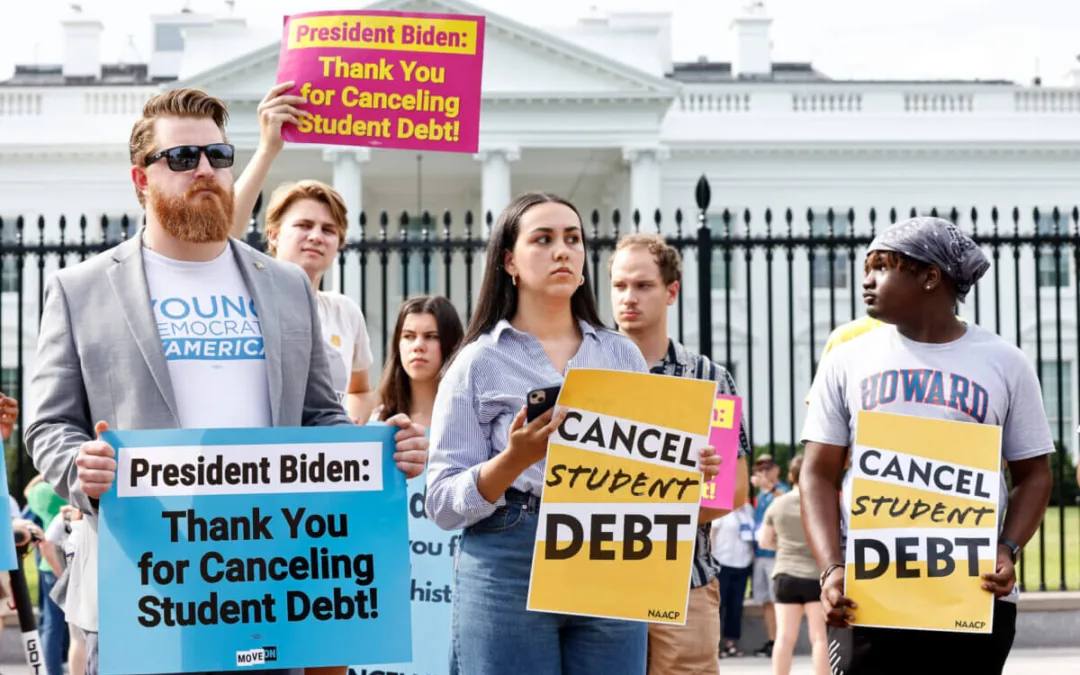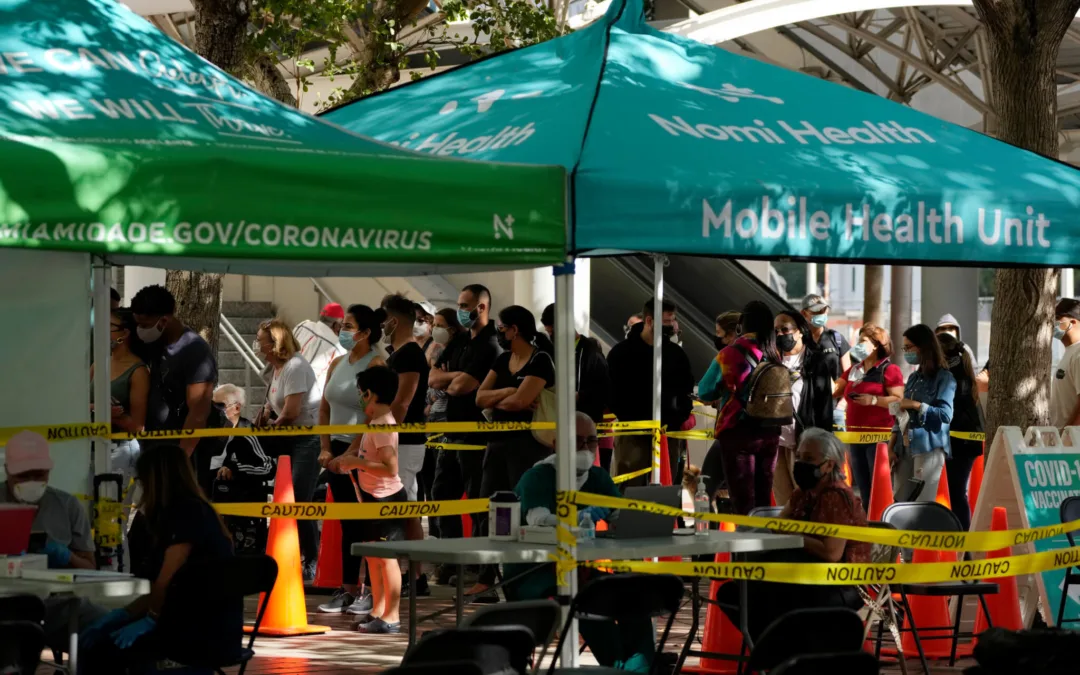
Many Democrats, economists, and experts say student loan debt forgiveness would have long-term benefits to the economy as a whole and provide relief for borrowers who are financially overburdened by student debt.
As millions of college seniors graduate into an uncertain economy plagued with historic job losses, one thing is sure to be weighing heavily on their minds: how to tackle their student loan debt.
Thanks to the CARES Act, the U.S. Department of Education has already agreed to suspend interest and payments on federal student loans until Sept. 30 because of the pandemic. That does not apply to private loans or loans for for-profit colleges.
Earlier this month, however, House Democrats approved the HEROES Act, a $3 trillion coronavirus relief bill that would offer, among other things, more help for college debt holders. In addition to extending the break on federal student loan payments to Sept. 30, 2021, the legislation also makes “economically distressed borrowers” and those with private student loans eligible for $10,000 in debt forgiveness.
Many Democrats, economists, and experts say that this is not enough. Student loan debt forgiveness, they argue, would have long-term benefits to the economy as a whole and provide relief for borrowers who are financially overburdened by student debt.
In April, Sens. Elizabeth Warren of Massachusetts and Sherrod Brown of Ohio released a policy proposal to protect consumers from debt amidst the economic crisis. In addition to offering provisions to keep relief checks from being seized by banks and creditors, strengthening the power of the Consumer Financial Protections Bureau, and proposing a pause on all debt collection, the proposal also included broad cancellation of student debt.
“This will ensure Americans don’t have a massive student debt load waiting for them on the other side of this emergency,” they write, “and help a generation of Americans who never fully recovered from our last economic crisis participate in stimulating our economy through this crisis.”
Student debt cancellation has grown in both popularity and political viability over the past year. It was a key platform in Vermont Sen. Bernie Sanders’ presidential platform, as well as Warren’s. Minnesota Rep. Ilhan Omar, another Democrat, introduced legislation to cancel all student debt in 2019. In late March, as the threat of the virus and the economic crisis deepened, Omar and fellow progressive Rep. Ayanna Pressley of Massachusetts introduced another bill that would cancel at least $30,000 of student debt per borrower.
Presumptive Democratic presidential candidate Joe Biden has also backed another plan from Senate Democrats to cancel $10,000 of student debt per person.
Considering the historic amount of federal dollars the government has been pouring into big and small business bailouts and loans, the idea of cancelling student debt is not as infeasible as many have previously believed.
“I mean, they do this all of the time,” Thomas Gokey, a financial activist and co-founder of Debt Collective, told COURIER. “The Federal Reserve is buying up all kinds of debt right now. In the last financial crisis they made debt disappear for the 1 percent. The small business loans—you know hundreds of billions of dollars of small business loans that will be converted essentially to grants,” he said, referring to the Paycheck Protection Program that grants loans to small businesses on the condition they maintain their payroll, with debt forgiveness options in nearly all cases. “So the idea that we can’t just make that disappear is a total fiction.”
Because the coronavirus crisis has deepened already vast economic divides in the United States, and particularly along racial lines, Gokey argues full student debt cancellation is more vital than ever. For-profit college loans, for example, are not covered by the CARES Act, but these loans most deeply affect low-income borrowers and communities of color.
“There’s a wealth of economic data that shows that student debt is a driver of the racial wealth gap,” said Gokey. “The students with the most student debt are women of color. And a lot of this has to do with the for-profit university sector, which specifically targets people of color, targets veterans, targets single mothers. These are the student accounts that end up with the largest balances.”
While Gokey said he believes full cancellation is a necessary step, even partial cancellation like the legislation introduced by Omar and Pressley, could still have a huge beneficial impact and, more importantly, build momentum for further debt relief. “If they do it once, the genie will be out of the bottle, and I think it will only build momentum because this economic crisis is just getting started. It’s very hard for us psychologically to wrap our heads around just how deep the Depression is.”
Congress has been largely deadlocked along partisan lines when it comes to pushing through new relief bills. Senate Democrats argue that their efforts to push forth more expansive economic relief are continually blocked by the Republican majority. Meanwhile, House Speaker Nancy’s Pelosi’s $3 trillion coronavirus relief package appears to be more of a pipe dream than anything that might be passable.
But Gokey said the ability to cancel student loan debt on a large scale has already been enshrined into law: The Higher Education Act (HEA) grants the Department of Education the authority to “compromise, waive, or release” any claims it has against student debtors.
“You know sometimes this is being presented as a way of bypassing Congress or using executive authority. That’s not really accurate,” Gokey said. “Congress already deliberated on this and voted on this as a part of the higher education reauthorization process.”
Warren is quite familiar with this mechanism, as she, with the help of a team of activists and attorneys, identified this clause in the HEA and used it to press the Obama administration and then-Secretary of Education Arne Duncan to cancel student loan debt for thousands of students who had been defrauded by the for-profit Corinthian College.
According to a white paper published by another Debt Collective activist, Luke Herrine, widespread student loan debt could be canceled in the same way.
RELATED: Have Student Loans? Betsy Devos Might Be Coming for Your Wages Even Though There’s a Pandemic
There are also other student loan forgiveness programs already in place, like those intended to cancel debt for student borrowers who work in public service. Department of Education Secretary Betsy DeVos has faced several lawsuits for failing to honor this program and denying applicants debt cancellation.
As Gokey notes, student debt cancellation is legally and realistically possible, but it represents a slippery slope for ideological Republicans. Once some student debt cancellation is proven possible, it could be harder to walk back such policies.
Politics

Teamsters and UPS Reach Tentative Deal to Avoid Strike, 340,000 Workers to Get Raises
The tentative deal represents a huge win for full- and part-time UPS Teamster workers, who would get significant pay raises and better working...



One Republican Senator Is Blocking 265 Military Promotions, Leaving the Marines Without a Confirmed Leader
Sen. Tommy Tuberville's decision means these military officers are not getting the pay raises they’re owed, cannot move their families to wherever...
Local News



Teamsters and UPS Reach Tentative Deal to Avoid Strike, 340,000 Workers to Get Raises
The tentative deal represents a huge win for full- and part-time UPS Teamster workers, who would get significant pay raises and better working...



One Republican Senator Is Blocking 265 Military Promotions, Leaving the Marines Without a Confirmed Leader
Sen. Tommy Tuberville's decision means these military officers are not getting the pay raises they’re owed, cannot move their families to wherever...




